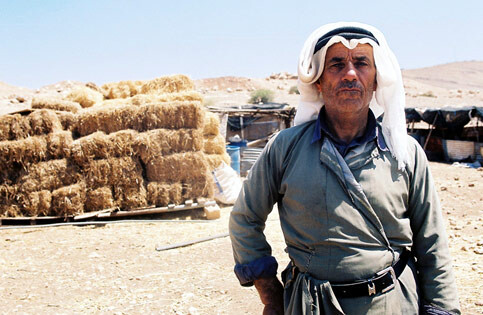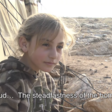The Electronic Intifada 8 August 2007

Hussain Bsharat from Makhool says grazing land for his flocks has been limited by the Israeli military. (Shabtai Gold/IRIN)
AL-HADIDIYA, 8 August 2007 (IRIN) - Palestinian residents of al-Hadidiya village in Jordan Valley (in the West Bank), live without electricity or running water and most importantly, they say, face demolition and evacuation orders.
“Five families tried to fight the orders in an Israeli court,” said Ali Bsharat, an al-Hadidiya resident. “They lost.”
The five then had to sign documents and commit to leave the area.
“We don’t want to leave,” Bsharat said, but implied that it may just be a matter of time before all the residents are forced to do so.
Tzidki Maimon from Israel’s Civil Administration in the West Bank explained the orders, saying the residents “invaded the land illegally. They set up tents and animal pens” in violation of Israeli laws in the occupied West Bank.
“Israel must take action against those acting illegally,” said Maimon.
The villagers said they moved to the land after their previous living area was declared a “military zone” by Israel.
Water
“In 1997 we were connected to Mekorot [the Israeli water company]. But, eight months later, they cut the water off, [they] closed the pipes,” said Saker from Hadidiya.
Residents and observers blamed the changing political situation inside Israel in the late 1990s for the decision.
The pipes, tauntingly still visible, stick out of the nearby ground, bringing water to Israeli settlements considered illegal under international law. This touches a nerve with Saker.
“We are doing no harm to Israel. We have rights to our land. Where are the settlers’ documents for land rights?” he asked, raising his voice in anger and frustration.
Amnesty International recently expressed concern, saying the villagers face “increasing pressures as the army restricts their movement and their access to water.”
Israeli human rights body
A new report by the Israeli human rights organization B’tselem launched on 7 August described the limitations on movement within the West Bank as “illegal” and said they constituted a form of collective punishment.
The report entitled “Ground to a Halt” said the limitations harmed the “Palestinian fabric of life,” including the economy, social ties and access to health care. It also impaired the ability to develop the health system.
“Israel has the right and duty to protect its citizens, but that protection must use legal means that do not violate human rights,” said Sarit Michaeli, a spokeswoman for B’tselem.
The group called on Israel to “immediately remove all the permanent and sweeping restrictions on movement inside the West Bank” and evacuate all settlements.
Movement restrictions
Meanwhile, an estimated 100 residents of Hadidiya, located in the northeast section of the West Bank in an area known as the Jordan Valley, must use tankers to bring in water.
However, due to the restrictions on movement, the water tanker and its tractor can be confiscated by the Israeli army if it deems them to be in violation of the rules dictating which roads can be used and when.
“This can mean we will be without water for a day,” said Saker, unless they hire a private replacement tractor, which triples the cost for the impoverished shepherds. Additionally, to get the tanker and tractor back they must pay hefty fines.
In nearby Makhool, a smaller encampment, about 80 residents face similar ordeals, except their water is more expensive as they do not own a tractor and must always pay the extra cost to hire one.
Restrictions on movement are a daily problem.
“Sometimes, if we graze too close to roads or the military bases, we can be detained or arrested by the army,” said Haj Hussain Bsharat.
The last time this happened to him, his flock was let loose on the side of the road while he was taken away, Bsharat said.
“We offered the people alternative solutions. They systematically refuse and ignore the law,” said Maimon from the Civil Administration.
No permission to build
Further south sits Furush Beit Dajan. About 15 percent of the local population are refugees from the 1948 War, registered with UNRWA, the UN agency for Palestinian refugees.
One refugee, Muhammed Balaine, whose family was originally from an area near Beersheba in Israel’s south, said “the main problem” for the village’s roughly 1,200 residents “is we have no permission to build. Our village is not on the official [Israeli] map” as it too is considered illegal.
Like Hadidiya, Furush Beit Dajan is in Area C, under full Israeli control, according to the Oslo Accords.
“My house is old. It has asbestos, which can cause cancer. It is bad for our health. We can’t put on a real roof, because then it would be considered a [full-fledged] building and at risk of demolition orders,” said Balaine.
Electricity
The villagers use generators for electricity, as they are not connected to the main grid. Balaine said this increases costs.
He envies a nearby village where the Spanish government paid for expensive solar panels, which generate electricity.
“They don’t have any expenses,” Balaine said, hoping that such a sustainable system would reach his village as well.
Restrictions on movement are a concern here too, as accessing the closest hospital involves traveling through several checkpoints, which aid workers say wastes precious time during an emergency.
Access to water is also a daily struggle. Three of the village’s seven wells were closed by nearby settlers for their own use, residents said.
“Water is the vein of life,” said Muhammed. “Water access for us diminishes each year,” he said. “Once the water is gone, that’s it.”
This item comes to you via IRIN, a UN humanitarian news and information service, but may not necessarily reflect the views of the United Nations or its agencies. All IRIN material may be reposted or reprinted free-of-charge; refer to the copyright page for conditions of use. IRIN is a project of the UN Office for the Coordination of Humanitarian Affairs.


